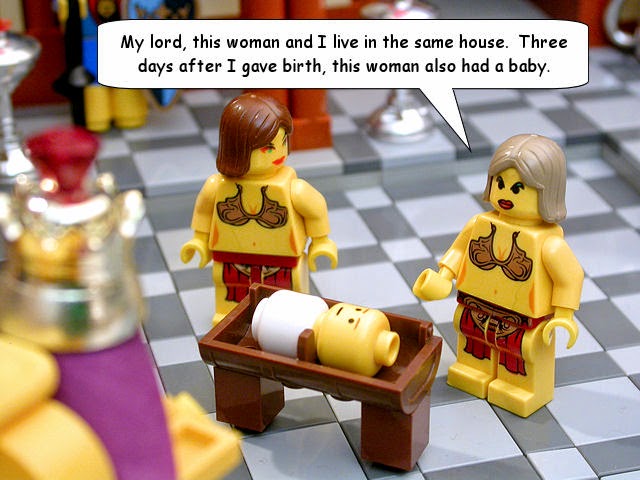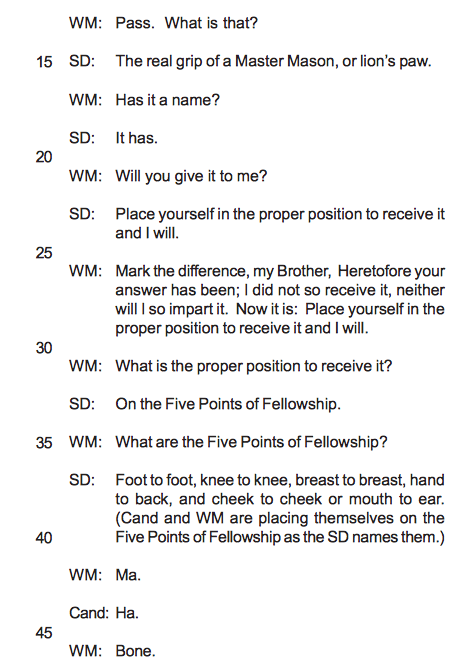King Solomon: Man of Wisdom, Man of Foolishness
1 Kings 3; 5–11
LDS manual: here
Reading
Abishag
This chapter certainly starts off with a bang: Kind David is old and cold, so they throw a girl into bed with him. Her name is Abishag, or as it is sometimes rendered — rather amusingly, given the situation — Avishag.
1 Kings 1:1 Now king David was old and stricken in years; and they covered him with clothes, but he gat no heat.
1:2 Wherefore his servants said unto him, Let there be sought for my lord the king a young virgin: and let her stand before the king, and let her cherish him, and let her lie in thy bosom, that my lord the king may get heat.
1:3 So they sought for a fair damsel throughout all the coasts of Israel, and found Abishag a Shunammite, and brought her to the king.
1:4 And the damsel was very fair, and cherished the king, and ministered to him: but the king knew her not.
All kinds of questions here. What does cherishing involve? Was Abishag kind of a hot name for a girl back then? Was the past tense of get really gat?
But we do know that the word shunamitism derives from this practice, meaning ‘throwing a young girl into bed with an old man to extend his life’. Believe it or not, it was encouraged in the 1800s.
In the 17th century, Francis Bacon approved King David’s practice, suggesting, however, that puppies might serve as well as young virgins.
Puppies? Forgive me, but this — while very cute — hardly seems an appropriate substitute. On the other hand, let’s have a moment of sympathy for this Shunammite girl, tossed into bed with a dusty old man. She probably didn’t want to be there.
Succession woes
The young Abishag, for her part, finds herself at the centre of a succession struggle, wonderfully summarised here.
David’s son Adonijah wants to be king after David dies, but Bathsheba wants the throne for Solomon. The prophet Nathan’s on board — Adonijah’s not that into him. So Bathsheba and Nathan bring David around.
1 Kings 1:29 And the king sware, and said, As the LORD liveth, that hath redeemed my soul out of all distress,
1:30 Even as I sware unto thee by the LORD God of Israel, saying, Assuredly Solomon thy son shall reign after me, and he shall sit upon my throne in my stead; even so will I certainly do this day.
Meanwhile, Adonijah and his friends is celebrating his accession to the throne.
1 Kings 1:9 And Adonijah slew sheep and oxen and fat cattle by the stone of Zoheleth, which is by Enrogel, and called all his brethren the king’s sons, and all the men of Judah the king’s servants:
But when they hear the news that David has backed Solomon, all of Adonijah’s friends bail, like Bob Alexander’s campaign event at the end of the movie Dave.
1 Kings 1:49 And all the guests that were with Adonijah were afraid, and rose up, and went every man his way.
Adonijah knows he’s in trouble, so he heads to the temple and grabs the horns of the altar. That’s a safe zone.
1 Kings 1:50 And Adonijah feared because of Solomon, and arose, and went, and caught hold on the horns of the altar.
Solomon tells him to knock it off; he’s not going to kill him.
1 Kings 1:52 And Solomon said, If he will shew himself a worthy man, there shall not an hair of him fall to the earth: but if wickedness shall be found in him, he shall die.
Now you’d think Adonijah would lie low after this, but no, he decides he wants to marry Abishag the Royal Hottie.
1 Kings 2:17 And [Adonijah] said, Speak, I pray thee, unto Solomon the king, (for he will not say thee nay,) that he give me Abishag the Shunammite to wife.
Even Bathsheba thinks this is uncontroversial.
1 Kings 2:18 And Bathsheba said, Well; I will speak for thee unto the king.
But Solomon is a little smarter than your average bear, and sees this as a power play. If Adonijah marries Abishag, who was in a way the last partner David had, it could be a claim to his legitimacy to the throne. Sorry, Adonijah, but you have played the game of thrones badly.
1 Kings 2:23 Then king Solomon sware by the LORD, saying, God do so to me, and more also, if Adonijah have not spoken this word against his own life.
2:24 Now therefore, as the LORD liveth, which hath established me, and set me on the throne of David my father, and who hath made me an house, as he promised, Adonijah shall be put to death this day.
2:25 And king Solomon sent by the hand of Benaiah the son of Jehoiada; and he fell upon him that he died.
In killing Adonijah, Solomon is only following in the ways of his father David, who used his last moments to settle some old scores. He commands Solomon to kill Joab and Shimei.
1 Kings 2:1 Now the days of David drew nigh that he should die; and he charged Solomon his son, saying,
2:2 I go the way of all the earth: be thou strong therefore, and shew thyself a man;
…
2:5 Moreover thou knowest also what Joab the son of Zeruiah did to me, and what he did to the two captains of the hosts of Israel, unto Abner the son of Ner, and unto Amasa the son of Jether, whom he slew, and shed the blood of war in peace, and put the blood of war upon his girdle that was about his loins, and in his shoes that were on his feet.
2:6 Do therefore according to thy wisdom, and let not his hoar head go down to the grave in peace.
…
2:8 And, behold, thou hast with thee Shimei the son of Gera, a Benjamite of Bahurim, which cursed me with a grievous curse in the day when I went to Mahanaim: but he came down to meet me at Jordan, and I sware to him by the LORD, saying, I will not put thee to death with the sword.
2:9 Now therefore hold him not guiltless: for thou art a wise man, and knowest what thou oughtest to do unto him; but his hoar head bring thou down to the grave with blood.
Dispute over a baby
This is the story everyone’s familiar with, but even my highly educated never-Mo girlfriend/wife had never heard it! So here it is.
Two women — sex workers — live together and have a baby each. In the night, one baby dies, and so now both are claiming the same live baby. Solomon considers, and instructs a nearby minion to cleave the living baby in twain, and distribute half to each women. Before the axeman can carry out this eminently fair proposition, one of the women bursts out, telling Solomon to keep the baby alive and to give it to the other woman.
1 Kings 3:26 Then spake the woman whose the living child was unto the king, for her bowels yearned upon her son, and she said, O my lord, give her the living child, and in no wise slay it. But the other said, Let it be neither mine nor thine, but divide it.
King Solomon halts the proceedings, and delivers the baby to the mum that wanted to keep it alive.
1 Kings 3:27 Then the king answered and said, Give her the living child, and in no wise slay it: she is the mother thereof.
Everyone’s really impressed.
1 Kings 3:28 And all Israel heard of the judgment which the king had judged; and they feared the king: for they saw that the wisdom of God was in him, to do judgment.
It’s even more impressive when you realise that it doesn’t matter if the woman was the real mother. The child would do best with whichever woman wanted it to be alive, regardless of maternity.
Since I can never resist a bit of Twain, here’s Huckleberry Finn and Jim arguing over this story. Please excuse the n-word as a product of language use at the time.
“WELL, den! Warn’ dat de beatenes’ notion in de worl’? You jes’ take en look at it a minute. Dah’s de stump, dah — dat’s one er de women; heah’s you — dat’s de yuther one; I’s Sollermun; en dish yer dollar bill’s de chile. Bofe un you claims it. What does I do? Does I shin aroun’ mongs’ de neighbors en fine out which un you de bill DO b’long to, en han’ it over to de right one, all safe en soun’, de way dat anybody dat had any gumption would? No; I take en whack de bill in TWO, en give half un it to you, en de yuther half to de yuther woman. Dat’s de way Sollermun was gwyne to do wid de chile. Now I want to ast you: what’s de use er dat half a bill? — can’t buy noth’n wid it. En what use is a half a chile? I wouldn’ give a dern for a million un um.”
“But hang it, Jim, you’ve clean missed the point — blame it, you’ve missed it a thousand mile.”
“Who? Me? Go ‘long. Doan’ talk to me ’bout yo’ pints. I reck’n I knows sense when I sees it; en dey ain’ no sense in sich doin’s as dat. De ‘spute warn’t ’bout a half a chile, de ‘spute was ’bout a whole chile; en de man dat think he kin settle a ‘spute ’bout a whole chile wid a half a chile doan’ know enough to come in out’n de rain. Doan’ talk to me ’bout Sollermun, Huck, I knows him by de back.”
“But I tell you you don’t get the point.”
“Blame de point! I reck’n I knows what I knows. En mine you, de REAL pint is down furder — it’s down deeper. It lays in de way Sollermun was raised. You take a man dat’s got on’y one or two chillen; is dat man gwyne to be waseful o’ chillen? No, he ain’t; he can’t ‘ford it. HE know how to value ’em. But you take a man dat’s got ’bout five million chillen runnin’ roun’ de house, en it’s diffunt. HE as soon chop a chile in two as a cat. Dey’s plenty mo’. A chile er two, mo’ er less, warn’t no consekens to Sollermun, dad fatch him!”
I never see such a nigger. If he got a notion in his head once, there warn’t no getting it out again. He was the most down on Solomon of any nigger I ever see.
The temple is built and dedicated
Solomon wants to build a temple. This is a positive sign: instead of war and conquest, Solomon is channeling the Israelites’ efforts into architecture. Not only would this be very beautiful, but also a sign of stability besides.
1 Kings 5:2 And Solomon sent to Hiram, saying,
5:3 Thou knowest how that David my father could not build an house unto the name of the LORD his God for the wars which were about him on every side, until the LORD put them under the soles of his feet.
5:4 But now the LORD my God hath given me rest on every side, so that there is neither adversary nor evil occurrent.
5:5 And, behold, I purpose to build an house unto the name of the LORD my God, as the LORD spake unto David my father, saying, Thy son, whom I will set upon thy throne in thy room, he shall build an house unto my name.
Old habits die hard, though; the opening ceremony involved the slaughter of 22,000 oxen and 120,000 sheep. How long would that have taken‽
1 Kings 8:63 And Solomon offered a sacrifice of peace offerings, which he offered unto the LORD, two and twenty thousand oxen, and an hundred and twenty thousand sheep. So the king and all the children of Israel dedicated the house of the LORD.
Whatever. I’m just glad that Mormons don’t sacrifice animals anymore. Instead, they just wave handkerchiefs around in an awkward and slightly dorky way.
Solomon marries foreign women
There has to be some conflict here, and it relates to Solomon’s choice of wives.
1 Kings 11:1 But king Solomon loved many strange women, together with the daughter of Pharaoh, women of the Moabites, Ammonites, Edomites, Zidonians, and Hittites:
11:2 Of the nations concerning which the LORD said unto the children of Israel, Ye shall not go in to them, neither shall they come in unto you: for surely they will turn away your heart after their gods: Solomon clave unto these in love.
That sounds great. That would have meant that the formerly warring kingdoms were integrating. But Jehovah/Jesus isn’t happy with that. He sees his monotheistic hold slipping away.
1 Kings 11:11 Wherefore the LORD said unto Solomon, Forasmuch as this is done of thee, and thou hast not kept my covenant and my statutes, which I have commanded thee, I will surely rend the kingdom from thee, and will give it to thy servant.
11:12 Notwithstanding in thy days I will not do it for David thy father’s sake: but I will rend it out of the hand of thy son.
The real lesson manual chastises Solomon for the sin of — having lots of wives? no — interfaith marriage, equating it with ‘turning away from God’.
How did Solomon’s choice of wives show that he had turned away from God? (See 1 Kings 11:1–2. He married out of the covenant.)
Ask: How do members in part-member families feel about this?
Main points from this lesson
Did Solomon’s temple exist?
We’ve seen a bit of a pattern here in the Old Testament. We read about the Flood — and then see that there’s no evidence for it. We read about the Exodus — and then find that there’s no evidence that the Hebrews were ever in Egypt at all.
And by the way, while I’m thinking of it, did you catch this bit of the church’s terrible new Book of Abraham essay?
But even this evidence of ancient origins, substantial though it may be, cannot prove the truthfulness of the book of Abraham any more than archaeological evidence can prove the exodus of the Israelites from Egypt or the Resurrection of the Son of God.
Comparing the Book of Abraham with two other fictitious events. That’s cute.
Anyway, while it may have been a bit of shock to find that these Bible stories have no evidentiary basis, it’s equally surprising to find that the trail of evidence never really gets started the further you go. And so it is with Solomon’s temple. The book of 1 Kings was written way after the fact — about 400 years after the temple was allegedly built — and no evidence for it exists.
Could Solomon’s temple have existed anyway? Well, much of 1 Kings is taken up with very specific detail that gives the whole thing an air of verisimilitude. Then again, fiction can be very detailed. Some works of fiction even come with their own constructed languages (which you can hear me talking about in Episodes 161 and 162 of my language podcast Talk the Talk).
Skeptic Brian Dunning, for his part, feels that we should believe the Solomon’s temple story until it’s disconfirmed…
Since we can’t verify that the temple existed, we certainly can’t say that the Holy of Holies did, and we can’t say that there was an Ark inside of it. However, there is a wealth of non-empirical evidence supporting the idea that Solomon, his temple, and the Ark within probably did exist. Historians going back through ancient Rome, such as Josephus, and ancient Greece, such as Herodotus, have all provided accounts that are generally consistent with the Biblical history of Solomon’s temple. I believe it’s fair to say that the existence of Solomon’s temple, and a gilt wooden ark hidden inside of it, are the null hypothesis. We’ve no compelling reason to doubt it.
…but it doesn’t work that way. Unspecified ‘non-empirical evidence’ might be okay for ordinary propositions, but I think I’d like a bit more before I sign off on this.
I feel the same way about Solomon’s temple as I feel about Jesus. It’s fine with me if it existed, and if more details come to light that confirm their veracity, I have no problem with that. On the other hand, I’m not holding my breath, and if the LDS Church wants people make important life choices based on this elaborate narrative, then it needs to support it with publicly verifiable evidence.
Temples, Solomon, and Freemasonry
Just about every Latter-day Saint has heard unflattering comparisons between Freemasonry and the Mormon temple ceremony, with the implication that Joseph Smith ripped off the Masonic ritual and incorporated it into the endowment.
While I’d always heard talk of such things, it wasn’t until I read a leaked copy of the Master Mason Degree ritual (PDF) that I fully understood the extent of Joseph Smith’s plagiarism (a representative slice is at right). I went through the LDS temple for the first time before the 1990 changes, so I remember the penalties and the Five Points of Fellowship, and they’re all there. It’s a wholesale transplant. What a spin-out. I found myself thinking, “Was there anything original that Smith did?”
See also Richard Packham’s convenient chart.
How do Mormons explain away the similarities? One common line of reasoning involves Solomon’s temple. The argument goes something like this:
- The LDS temple ceremony was practiced in Solomon’s temple.
- Solomon’s temple was built by stone masons, who had access to the temple ceremony.
- Those same masons formed Freemasonry.
- They therefore pilfered the temple ceremony from Solomon’s temple, and used it for their own.
As a believer, I accepted this explanation for a while, until I became aware that Freemasonry does not go back to the time of Solomon’s temple, supposedly about 900 BCE. In fact, organised Freemasonry starts in the 1700s, and probably goes no farther back than the 1200s or 1300s. Even that might be a bit generous — Cecil Adams of the Straight Dope pegs it at the 1500s. By the way, Uncle Cecil’s description of Masonic handshakes might raise a tremor for an endowment holder.
In shaking hands, for example, a Master Mason will press his thumb between the other guy’s second and third knuckles, thereby identifying himself to initiates while leaving others clueless.
And more handshakes and drawings here. Beware, though: evangelical Christianity.
To say that Freemasons borrowed the temple ceremony from proto-Mormons is to get it exactly backwards. It was Joseph Smith that remixed the Masonic ritual into what is now the LDS temple endowment.
Additional ideas for teaching
King Solomon and the Queen of Sheba: Is it true about those two?
The book of 1 Kings has this little subplot about a powerful woman — the Queen of Sheba — who came to visit Solomon.
1 Kings 10:1 And when the queen of Sheba heard of the fame of Solomon concerning the name of the LORD, she came to prove him with hard questions.
10:2 And she came to Jerusalem with a very great train, with camels that bare spices, and very much gold, and precious stones: and when she was come to Solomon, she communed with him of all that was in her heart.
10:3 And Solomon told her all her questions: there was not any thing hid from the king, which he told her not.
I would have loved to be a fly on the wall for this supposed meeting; it sounds like a meeting between two intelligent people who found an intellectual kinship. And when people bond in this way, things can get… well… a little bit hot.
1 Kings 10:13 And king Solomon gave unto the queen of Sheba all her desire, whatsoever she asked, beside that which Solomon gave her of his royal bounty. So she turned and went to her own country, she and her servants.
Certainly film and artwork have had no trouble filling in the gaps in the narrative.
At this point, we need to look back on the Bible and see the two similar stories we’ve run across: David and Jonathan, and Ruth and Boaz. In both of these, the Bible is maddeningly circumspect in its details. But are we to believe that nothing went on there? Were these rough and semi-barbaric people secretly the inventors of Victorian morality? Even though the text doesn’t explicitly sanction such a reading, you have to look at this and say, come on.
Another thing: when there’s no sex, as with David and Abishag, the text specifically says, “He knew her not.” If that’s not there, some bets are off.
So my take, as Gospel Doctrine for the Godless teacher: They totally did it.
pi = 3
As we all know, the value of pi (π) — the ratio of the circumference of a circle and its diameter — is 3.141592… and on and on and on.
And if you didn’t know the value of π, just remember this sentence: “Boy, I wish I could calculate pi.” The number of letters in each word corresponds to each digit. Science moment of the day.
But a common atheist criticism is that the Bible puts the value of π at just plain 3. How so? Well, 1 Kings 7 gives some measurements of the ‘molten sea’, which was a vessel of some kind.
1 Kings 7:23 And he made a molten sea, ten cubits from the one brim to the other: it was round all about, and his height was five cubits: and a line of thirty cubits did compass it round about.
That makes π = 30/10, or just plain 3.
I actually think this is not a good argument against the Bible. Remember, π is a transcendental number, so the flow of digits never stops and never repeats. That means that any value of π given in the Bible could be considered insufficiently precise to anyone who decided to think so. Bible says 3? That’s not accurate. Bible says 3.1? Also inaccurate.
So this is on my list of Arguments Atheists Shouldn’t Use.
And yet… this is a bit of a missed opportunity for Jehovah/Jesus. He could have stuck an easter egg in the text, something like “The number thereof never endeth.” That way, when people found out more about π (and it wouldn’t have taken long), they could have been amazed by the Bible’s accuracy, instead of patting the ancient Hebrews on the back and saying, “There, there; you weren’t to have known about geometry.” Too bad.






0 Comments
1 Pingback